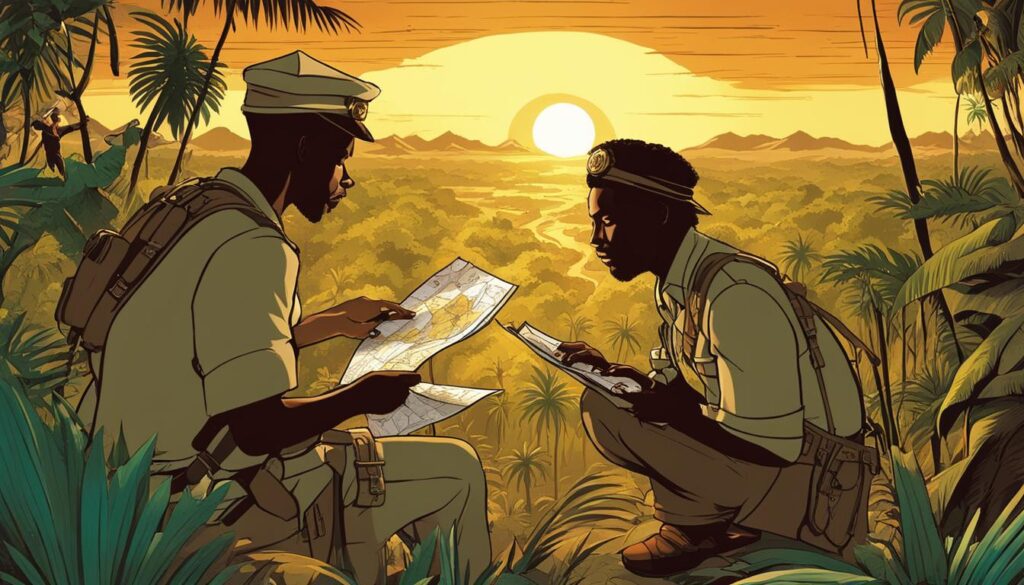In “Into Africa,” Martin Dugard takes readers on a thrilling journey through the African wilderness, tracing the epic adventures of explorers Stanley and Livingstone. The book offers an engrossing account of their remarkable achievements, providing insights into their personalities, motivations, and the challenges they faced. Dugard’s vivid prose brings to life the awe-inspiring landscapes, the dangers of the wilderness, and the enduring legacy of these intrepid explorers. This article will provide a comprehensive summary of “Into Africa,” highlighting its key themes, characters, and messages.
Key Takeaways:
- Martin Dugard’s “Into Africa” chronicles the adventures of explorers Stanley and Livingstone in the African wilderness.
- The book offers insights into their personalities, motivations, and the challenges they faced.
- Dugard’s vivid prose brings to life the awe-inspiring landscapes, the dangers of the wilderness, and the lasting impact of their achievements.
- The book explores themes such as exploration, colonialism, friendship, and the human spirit.
- “Into Africa” is a must-read for anyone interested in African geography, history, and exploration.
Overview of “Into Africa”
In “Into Africa,” Martin Dugard takes readers on an extraordinary journey through the African continent, detailing the epic adventures of Stanley and Livingstone. Dugard’s extensive research and vivid storytelling bring to life the dangerous and fascinating world of 19th century African exploration.
At its core, “Into Africa” is a thrilling tale of perseverance, courage, and friendship. The book offers readers a unique perspective on the human spirit, exploring the lengths to which individuals will go in pursuit of their goals.
Stanley and Livingstone, two of the most prominent explorers of their time, stand at the center of this captivating narrative. Through Dugard’s writing, we are introduced to their distinct personalities, their driving motivations, and the indelible mark they left on the world.
“Into Africa” is a masterful work of non-fiction, blending historical accuracy with a gripping narrative. Dugard’s impeccable research and attention to detail make this book a must-read for anyone interested in the world of African exploration.
Stanley’s Journey to Find Livingstone
In “Into Africa,” Martin Dugard details the incredible journey of Henry Stanley to find the missing explorer, Dr. David Livingstone. Stanley faced numerous challenges on his quest, including lack of supplies, hostile tribes, and treacherous terrain. Despite these obstacles, Stanley persevered and continued on, displaying immense courage and determination. Thanks to his unwavering spirit, Stanley’s search ultimately led him to Livingstone, a momentous encounter that would change both of their lives forever.
Through vivid descriptions and meticulous research, Dugard brings to life Stanley’s incredible journey to find Livingstone in a way that is both captivating and informative. Readers are drawn into the harsh realities of the African wilderness, but also into the perseverance and bravery of these two explorers who risked everything to uncover new territories and expand human knowledge.
Livingstone’s Explorations in Africa
In the mid-1800s, David Livingstone embarked on a series of explorations that would change the course of African geography and history. He ventured beyond the known territories of European colonizers, seeking to uncover the mysteries of the African continent. Over the course of his travels, Livingstone mapped large sections of central Africa, discovering numerous waterfalls and river systems.
His encounters with local tribes were marked by respect and curiosity, rather than the usual prejudice and violence that characterized colonial relations. Livingstone’s approach laid the groundwork for a more empathetic and collaborative approach to African exploration, one that respected the cultures and traditions of local peoples.
Livingstone’s influence extended far beyond the continent. His work inspired new generations of explorers and scientists, and his advocacy for African freedom and independence sparked widespread social change. Perhaps his most significant contribution was his unwavering commitment to truth and justice, which serves as a shining example of what is possible when we seek to understand and cherish diverse cultures and peoples.
| Livingstone’s Accomplishments | Impact |
|---|---|
| Discovered Victoria Falls | Put African geography on the world map |
| Encountered numerous local tribes | Challenged colonial attitudes towards African cultures |
| Advocated for African freedom and independence | Spark widespread social change |
Livingstone’s explorations continue to inspire new generations of adventurers and scholars. His commitment to unbiased exploration and respect for local cultures remains an enduring legacy that continues to shape our understanding of Africa and its place in the world.
Stanley and Livingstone’s Meeting
The long-awaited meeting between Stanley and Livingstone was a momentous event. After months of searching, Stanley finally found Livingstone in the village of Ujiji on the shores of Lake Tanganyika.
According to the book Into Africa, “As they approached each other, Stanley could see that the other man was wan, with lines etched deep into his gaunt face. Stooped from years of living in the field, Livingstone appeared smaller than Stanley had expected.”
The moment of their encounter was captured in history, and the bond between the two explorers was cemented forever. They spent several months together, discussing their adventures and mapping out their future plans.
The meeting between Stanley and Livingstone was a significant moment in their respective journeys, and this unforgettable encounter is one of the most remarkable events detailed in Dugard’s book.

Challenges and Dangers in the African Wilderness
Stanley and Livingstone’s journey through the African wilderness was fraught with peril. The dangers they faced were numerous, ranging from harrowing wildlife encounters to hostile tribal attacks. They also had to contend with harsh environmental conditions, including unforgiving terrain and brutal weather.
The unpredictability of the African wilderness posed significant challenges for the explorers. As they ventured into uncharted territories, they encountered numerous obstacles that threatened their safety and survival. One of the most significant dangers they faced was wildlife, including lions, crocodiles, and deadly insects. These animals presented a constant threat, and the explorers had to remain ever-vigilant.
Another danger the explorers faced was hostile tribal attacks. As they ventured further into Africa, they encountered various tribes that were often wary of outsiders. Stanley and Livingstone had to be cautious in their interactions with these tribes to avoid conflicts and ensure their safety.
In addition to these dangers, the explorers also had to deal with harsh environmental conditions. They faced steep hills, dense forests, and treacherous swamps that made travel difficult and exhausting. The explorers were also vulnerable to extreme weather conditions, including scorching heat and torrential rain.
Despite these challenges, Stanley and Livingstone persevered, driven by their unwavering determination to achieve their goals. Their courage in the face of adversity inspired generations of explorers, and their adventures continue to captivate readers today.
Significance and Legacy of Stanley and Livingstone’s Adventures
Stanley and Livingstone’s adventures were not just remarkable for their own time but continue to have a significant impact on African history and exploration today. Their expeditions paved the way for future exploration and research, inspiring generations of adventurers and scholars alike.
Their journeys gave scientists, historians, and the general public greater insight into the geography, flora, fauna, and people of Africa. Their adventuring stories captured the public imagination both in their time and today, with books and films chronicling their exploits.
Perhaps most significantly, their dealings with local tribes served as models for respectful, positive interactions between Western explorers and indigenous communities. This approach would go on to influence future explorations, helping to foster greater cultural exchange and understanding.
| Impact of Stanley and Livingstone’s Adventures | Legacy |
|---|---|
| Charted new territories and mapped previously unknown areas of Africa | Helped establish the foundations of African exploration |
| Opened up trade routes and created new opportunities for commerce | Inspired a new generation of explorers and adventurers |
| Brought attention to the need for exploration and research in Africa | Encouraged increased investment in African exploration and research |
“I am prepared to go anywhere, provided it be forward.” – David Livingstone
The legacy of Stanley and Livingstone’s adventures lives on, a testament to their bravery, defiance of the odds, and tireless spirit of exploration.
Themes and Messages in “Into Africa”
While “Into Africa” is a thrilling adventure tale, it also explores several important themes and messages. Throughout the book, author Martin Dugard emphasizes the following:
- Exploration: “Into Africa” highlights the impact of exploration on the African continent and European history. The book showcases the bravery and pioneering spirit of those who seek to discover the unknown.
- Colonialism: Dugard also explores the impact of colonialism on Africa, emphasizing the negative consequences that have persisted for centuries. Through vivid descriptions of tribal cultures and encounters with white settlers, the book provides insight into the complex dynamics of colonialism.
- Friendship: While much of “Into Africa” focuses on the individual journeys of Stanley and Livingstone, the book also highlights the importance of friendship. The bond that forms between the two men is central to the story and underscores the power of human connection.
- The Human Spirit: Above all, “Into Africa” is a story of triumph over adversity. The book showcases the indomitable human spirit and reminds us of the power of perseverance and determination.
Through these themes and messages, “Into Africa” offers a deeper understanding of history, culture, and the human experience.
Conclusion
In conclusion, “Into Africa” by Martin Dugard is a riveting account of the epic adventures of Stanley and Livingstone that takes readers on a journey through the heart of Africa. From Stanley’s perilous journey to find Livingstone to the duo’s meeting and subsequent explorations, the book captures the courage, determination, and resilience of these two legendary explorers.
The book provides a comprehensive summary of the challenges and dangers faced by Stanley and Livingstone in the African wilderness, as well as the impact of their explorations on African geography, European colonialism, and subsequent expeditions. It also explores various themes such as exploration, colonialism, friendship, and the human spirit, providing readers with insights into the deeper meaning and implications of the book.
In summary, “Into Africa” is an excellent book that combines adventure, history, and human interest to deliver a memorable reading experience. It is a must-read for anyone interested in African history, exploration, or the human spirit. By providing a detailed book summary, we hope to have given readers a glimpse into the world of Stanley and Livingstone and encourage them to read the book in its entirety.



